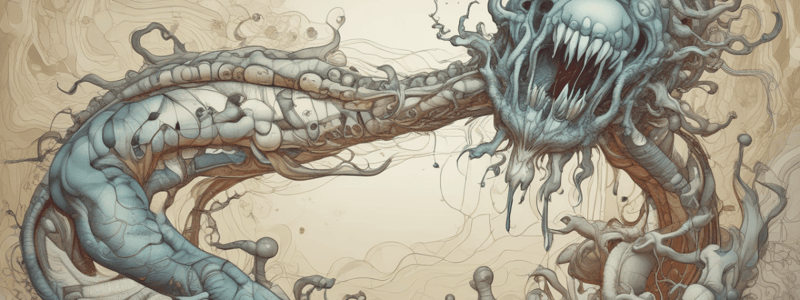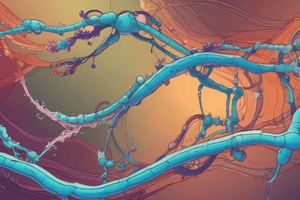Podcast
Questions and Answers
What does an organism's genotype depend on?
What does an organism's genotype depend on?
- The phenotype
- The sequence of amino acids in its proteins
- The proteins it makes
- The sequence of bases in its DNA (correct)
What is the role of alleles of the same gene?
What is the role of alleles of the same gene?
- They differ in their DNA sequence (correct)
- They code for different proteins
- They have the same amino acid sequence
- They perform different functions in the cell
During translation, which direction are mRNA base triplets read?
During translation, which direction are mRNA base triplets read?
- From amino acids to DNA
- In a random direction
- 3¢ to 5¢ direction
- 5¢ to 3¢ direction (correct)
Which type of mutations involve changes at the chromosome level?
Which type of mutations involve changes at the chromosome level?
What is the consequence of a mutation on an organism's phenotype?
What is the consequence of a mutation on an organism's phenotype?
What does the genetic code specify?
What does the genetic code specify?
Why does the genetic code have to be in triplets?
Why does the genetic code have to be in triplets?
What does AUG code for in the genetic code?
What does AUG code for in the genetic code?
What does it mean for the genetic code to be redundant but not ambiguous?
What does it mean for the genetic code to be redundant but not ambiguous?
Which mechanism ensures that an mRNA is read in the correct reading frame?
Which mechanism ensures that an mRNA is read in the correct reading frame?
What is the role of mRNA in the Central Dogma process?
What is the role of mRNA in the Central Dogma process?
Which of the following is a characteristic of the Genetic Code?
Which of the following is a characteristic of the Genetic Code?
In the context of Mutations, what are Point Mutations?
In the context of Mutations, what are Point Mutations?
What is the main exception to the Central Dogma process?
What is the main exception to the Central Dogma process?
How is Translation related to the Central Dogma process?
How is Translation related to the Central Dogma process?
What term describes the property of the genetic code that allows multiple codons to code for the same amino acid?
What term describes the property of the genetic code that allows multiple codons to code for the same amino acid?
Which of the following is NOT one of the five properties of the genetic code?
Which of the following is NOT one of the five properties of the genetic code?
Which type of mutation results from a small number of base changes in an organism's DNA?
Which type of mutation results from a small number of base changes in an organism's DNA?
In the Central Dogma, what does the term 'genotype' refer to?
In the Central Dogma, what does the term 'genotype' refer to?
'Exceptions to the Central Dogma' primarily refer to processes where:
'Exceptions to the Central Dogma' primarily refer to processes where:
During translation, the mRNA base triplets are read in the 3' to 5' direction.
During translation, the mRNA base triplets are read in the 3' to 5' direction.
Reverse transcriptase synthesizes RNA from a DNA template in the process of information flow.
Reverse transcriptase synthesizes RNA from a DNA template in the process of information flow.
Each codon specifies the addition of only one of 64 amino acids.
Each codon specifies the addition of only one of 64 amino acids.
Multiple codons code for the same amino acid due to the property of the genetic code called ambiguity.
Multiple codons code for the same amino acid due to the property of the genetic code called ambiguity.
Alleles of the same gene have different DNA sequences but produce proteins with identical amino acid sequences.
Alleles of the same gene have different DNA sequences but produce proteins with identical amino acid sequences.
The central dogma of molecular biology states that RNA codes for DNA.
The central dogma of molecular biology states that RNA codes for DNA.
Point mutations occur at the chromosome level.
Point mutations occur at the chromosome level.
Exceptions to the Central Dogma always involve the flow of information from DNA to proteins.
Exceptions to the Central Dogma always involve the flow of information from DNA to proteins.
The genetic code is characterized by having only one codon for each amino acid.
The genetic code is characterized by having only one codon for each amino acid.
In the context of mutations, chromosome-level mutations always result in a change in an organism's phenotype.
In the context of mutations, chromosome-level mutations always result in a change in an organism's phenotype.
The genetic code is specific to each organism and varies significantly from one species to another.
The genetic code is specific to each organism and varies significantly from one species to another.
Genes can be transcribed and translated after being transferred from one species to another.
Genes can be transcribed and translated after being transferred from one species to another.
Point mutations involve large-scale changes in an organism's DNA.
Point mutations involve large-scale changes in an organism's DNA.
The genetic code is non-redundant, meaning each codon uniquely corresponds to a single amino acid.
The genetic code is non-redundant, meaning each codon uniquely corresponds to a single amino acid.
Exceptions to the Central Dogma primarily involve processes where information flows from proteins back to DNA.
Exceptions to the Central Dogma primarily involve processes where information flows from proteins back to DNA.
The genetic code is ambiguous because each codon only codes for one amino acid.
The genetic code is ambiguous because each codon only codes for one amino acid.
During translation, the start codon also codes for the initiation of protein synthesis.
During translation, the start codon also codes for the initiation of protein synthesis.
All 64 codons code for different amino acids in the genetic code.
All 64 codons code for different amino acids in the genetic code.
Mutations only occur at the nucleotide level and never at the chromosome level.
Mutations only occur at the nucleotide level and never at the chromosome level.
The Central Dogma states that information flows from protein to gene to mRNA.
The Central Dogma states that information flows from protein to gene to mRNA.
Flashcards are hidden until you start studying




